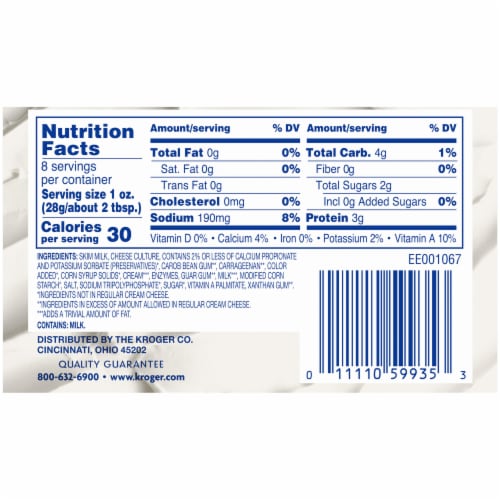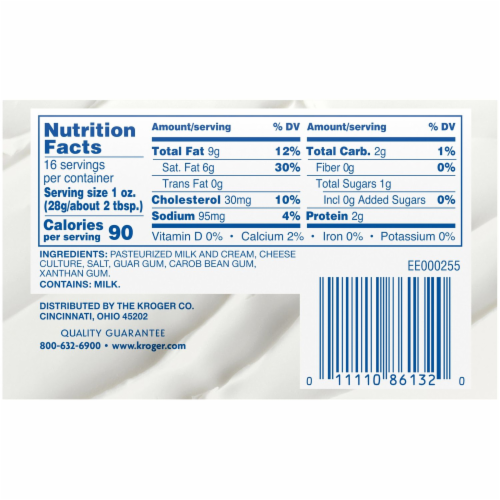Nutrition Facts Cream Cheese is a fresh cheese made from milk and cream. It is best consumed fresh. It is rich in fat and calories but low in protein.
Cream cheese can be part of a balanced diet when used in moderation. Its creamy and mild taste makes it a versatile dairy spread that can be used in a variety of dishes. This cheese is a good source of vitamin A and is low in lactose, making it suitable for many individuals.
However, as it is high in fat and calories, it should be consumed in moderation. Whipped cream cheese variants are lower in fat and calories, providing a lighter option for those watching their intake. We explore the nutrition facts of cream cheese and its potential health benefits and downsides.

Credit: www.kroger.com
What Is Cream Cheese?
Cream cheese is a soft, usually mild-tasting fresh cheese made from milk and cream. It is not naturally matured and is meant to be consumed fresh, setting it apart from other soft cheeses such as Brie and Neufchâtel. It is more comparable to Boursin and mascarpone in terms of taste, texture, and production methods.
Ingredients
Cream cheese is typically made from cream, milk, and other dairy ingredients.
Nutritional Composition
Cream cheese is rich in vitamin A and contains minimal lactose. However, it is low in protein, fat, and calories, so moderation is key. Whipped cream cheese, in particular, offers a lower fat and calorie content.

Credit: www.super1foods.com
Health Benefits Of Cream Cheese
Cream cheese is a delicious spread and offers several health benefits. Let’s explore how it can be a valuable addition to your diet.
Calcium-rich
Cream cheese is a good calcium source, essential for maintaining strong bones and teeth. A one-ounce serving provides about 55 milligrams of calcium, contributing to your daily intake.
Protein Source
While cream cheese is not a high source of protein, it still provides a moderate amount. This makes it a good option for adding extra protein to your meals or snacks.
Vitamin Content
Cream cheese contains vitamin A, essential for vision, immune function, and skin health. Including cream cheese in your diet can help you meet your daily vitamin A needs.
Weight Management
Due to its higher fat and calorie content, cream cheese must be consumed in moderation. If you are watching your caloric intake, opt for lighter versions, such as whipped cream cheese. Pairing it with high-fiber foods can also help you manage weight effectively.
Potential Concerns
Cream cheese, while delicious, may pose some potential concerns when consumed in excessive amounts. Below are some key considerations:
High In Fat And Calories
Cream cheese is high in fat and calories, which can contribute to weight gain if overconsumed.
Sodium Content
The sodium content in cream cheese can be a concern for individuals monitoring their salt intake, as excessive sodium can lead to health issues.
Limited Nutrient Diversity
Cream cheese lacks nutrient diversity, offering minimal nutrients beyond fat and calories.
Different Types Of Cream Cheese
Cream cheese is a soft, mild-tasting fresh cheese made from milk and cream. It is low in protein, fat, and calories, so it’s best used in moderation. However, versions like whipped cream cheese are lower in fat and calories.
Regular Cream Cheese
Regular cream cheese is the classic, creamy spread we all know and love. It is made from milk and cream, producing a smooth and rich texture. This type of cream cheese is perfect for spreading on bagels, toast, or crackers. It can also be used in various recipes, such as cheesecakes, dips, and frostings.
Reduced Fat Cream Cheese
For those looking for a lighter option, reduced-fat cream cheese is a great choice. It has a lower fat content than regular cream cheese, making it a healthier alternative. Despite this, it still maintains a creamy texture and a delicious taste. Reduced-fat cream cheese can be used like regular cream cheese, providing a guilt-free option for your favourite dishes.
Flavored Cream Cheese
If you want to add extra flavour to your cream cheese, then flavoured varieties are the way to go. Flavoured cream cheese comes in various options, such as chive and onion, strawberry, garlic, and herb. These additions give the cream cheese a unique and tasty twist, perfect for adding flavour to your morning bagel or sandwich. Flavoured cream cheese can also be used in savoury recipes, such as stuffed chicken breasts or topping for baked potatoes. Overall, the different types of cream cheese offer various options to suit multiple preferences and dietary needs. Whether you prefer the classic taste of regular cream cheese, the lighter option of reduced-fat cream cheese, or the added flavour of flavoured varieties, cream cheese is a versatile and delicious spread that can elevate your meals and snacks.
Cream Cheese In Recipes
Cream cheese is a versatile dairy spread rich in Vitamin A but low in protein. With moderate use, it can be part of a balanced diet, offering lower fat and calorie options like whipped cream cheese for healthier choices. Benefit from its flavour and nutrition in your recipes.
Cream Cheese in Recipes Cream cheese is a versatile ingredient that can enhance the flavour and texture of various dishes. Its creamy and tangy profile makes it a popular choice for savoury and sweet recipes. Whether spread on a bagel, used as a dip, or incorporated into desserts and Baking, cream cheese adds a rich and indulgent element to any culinary creation. H3 headings Bagels and Toast Dips and Spreads Desserts and Baking Bagels and Toast Cream cheese is a classic topping. Baking bagels and toast add a creamy and savoury element. Whether paired with smoked salmon or cucumber or enjoyed on its own, cream cheese provides a luscious spread that perfectly complements the texture of bagels and toast. Dips and Spreads In dip recipes, cream cheese adds a luxurious creaminess and subtle tang that elevates the flavour. From spinach and artichoke dip to buffalo chicken dip, cream cheese serves as a versatile base that marries the flavours of the other ingredients while providing a smooth and satisfying texture. Desserts and Baking When it comes to desserts and Baking, cream cheese is a critical component in cheesecakes, brownies, and frosting recipes. Its richness and tangy flavor create a decadent textureBakingaste, making it an essential inBakingnt for creating indulgent and luscious treats. Incorporating cream cheese into your culinary creations can elevate the taste and texture of various dishes, adding a creamy, tangy, and indulgent element that enhances the overall flavour profile. Whether used as a spread, a base for dips, or a critical component in desserts and Baking, cream cheese offers a versatile and delicious addition to various recipes.

Credit: www.kroger.com
How To Choose And Store Cream Cheese
Cream cheese is a versatile dairy spread that is low in lactose, and a good source of vitamin A. Moderation is vital when using it, as it’s low in protein and high in fat and calories. Opt for types like whipped cream cheese for lower fat and calories.
When storing, keep it tightly wrapped in the fridge for ultimate freshness.
Quality And Freshness
Cream cheese is a soft, mild-tasting fresh cheese made from milk and cream. Unlike matured cheeses like Brie or Neufchâtel, it is best consumed fresh. For optimal taste and texture, choose cream cheese that is fresh and high-quality.
Storage Tips
Proper storage is crucial to maintain the freshness of cream cheese. Follow these tips:
- Keep cream cheese refrigerated at all times.
- Store cream cheese in its original packaging or an airtight container to prevent it from absorbing odours from the fridge.
- Consume cream cheese within the recommended expiration date for the best quality.
By selecting quality cream cheese and following proper storage practices, you can enjoy its creamy goodness for longer.
Cream Cheese Substitutes
Cream cheese is a popular ingredient in many recipes, but if you’re looking for alternatives due to dietary restrictions or preferences, there are several options to consider. If you want to reduce fat, increase protein, or simply try something new, here are some cream cheese substitutes to consider.
Greek Yogurt
Greek yogurt is a versatile substitute for cream cheese, offering a tangy flavour and creamy texture. It is lower in fat and calories while significantly boosting protein. It is essential to consider the thickness and consistency when using Greek yogurt as a substitute, as it may require additional straining to achieve a similar texture to cream cheese.
Cottage Cheese
Cottage cheese can also be a suitable alternative to cream cheese. It offers a mild flavour and creamy texture, is lower in fat and calories, and provides a good source of protein. When using cottage cheese as a substitute, it is recommended that you blend it until smooth to mimic the consistency of cream cheese.
Frequently Asked Questions Nutrition Facts Cream Cheese
Is Cream Cheese A Healthy Cheese?
Cream cheese is a versatile spread, rich in vitamin A but low in protein. It’s also high in fat and calories, so moderation is key. Whipped cream cheese has less fat and calories. It offers a lower calorie and fat content and more protein than butter.
Cream cheese can aid gut health due to its low lactose content, vitamin A, and beneficial bacteria. However, it may not be suitable for those with specific dietary restrictions.
Is Cream Cheese Better For You Than Butter?
Cream cheese is generally healthier than butter, with lower calories and fat. It’s a good spread for calorie-restricted or high-protein diets. However, it is lower in protein and higher in fat, so use it in moderation. Whipped cream cheese has fewer calories and fat.
Does Cream Cheese Have Sugar Or Carbs?
Cream cheese generally has minimal sugar and carbs, making it a low-carb option. Be mindful of added ingredients.
Is Cream Cheese Healthy For Your Stomach?
Cream cheese is a versatile dairy spread with lower protein and higher fat and calorie content. It’s best to use it in moderation, but versions like whipped cream cheese are lower in fat and calories. It is low in lactose and contains vitamin A and beneficial bacteria for gut health.
Conclusion
Cream cheese is a versatile dairy spread, rich in vitamin A but low in protein. Due to its high fat and calorie content, moderation is key. Opt for lighter versions for a healthier choice. Taste and nutrition blend in this creamy delight.
Enjoy cream cheese wisely!






